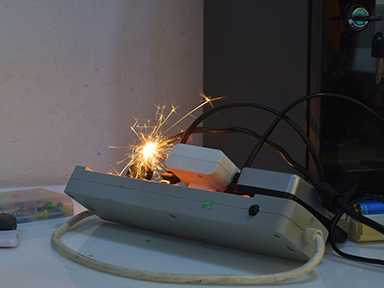From smartphones to power tools and electric vehicles, lithium-ion batteries are everywhere, and increasingly common in rental homes. But with this convenience comes serious fire risk.
Last year alone, more than 1,000 fires in Australia were linked to lithium-ion batteries. These fires are often caused by overheating, using the wrong charger, physical damage (such as being dropped), or charging devices near flammable materials. When these batteries fail, they can cause explosions, release toxic gas, and result in significant property damage or even death.
What this means for your investment property
Tenants are likely charging phones, laptops, vacuums, power tools, and e-bikes inside your rental. These devices often remain plugged in overnight or are charged on soft furnishings, increasing the fire risk.
The rise in electric vehicles (EVs) and light EVs (e-scooters, e-bikes) also means more tenants will be storing and charging larger lithium-ion batteries at home.
A quick note on EV chargers: Consider carefully
With over 180,000 EVs on Australian roads, tenants may request EV charging stations. Before agreeing, landlords should consider:
-
Safety and compliance. Poor installation could lead to fire.
-
Insurance risks. Faulty workmanship or negligence may void coverage.
-
Strata considerations. In apartments or townhouses, this may involve body corporate approval.
How landlords can reduce risk
With lithium-ion battery fires on the rise, there are a few simple steps landlords can take to help protect their investment properties and tenants. Consider the following:
-
Ensure working smoke alarms are installed.
-
Consider supplying fire blankets and an F-500 fire extinguisher (suitable for lithium fires).
-
Share charging safety tips with tenants.
-
Discuss EV charging expectations upfront and include rules in the lease agreement.
-
Ensure you have specialist landlord insurance that covers fire.
Insurance implications
Fires caused by lithium-ion batteries may be covered under landlord insurance, but cover is not guaranteed and depends on the circumstances of the fire.
If the fire is the result of tenant misuse (for example, using the wrong charger or overcharging a device) or a genuine accident, the damage is generally covered under most landlord insurance policies.
However, if the fire is found to have been caused by faulty installation (such as an incorrectly fitted EV charging station) or due to negligence (by either the landlord, tenant, or a third party), the claim could be denied.
NOTE: Every claim is assessed individually.
Questions?
As the use of lithium-ion batteries continues to grow, so does the fire risk, and the complexity of claims. If you need help understanding your coverage, contact EBM RentCover on 1800 661 662.
*While we have taken care to ensure the information above is true and correct at the time of publication, changes in circumstances and legislation after the displayed date may impact the accuracy of this article. If you need us we are here, contact 1800 661 662 if you have any questions.
You may also like
View all
Do you know what to do if an electrical fault is found at your rental property?...

Though unpleasant to consider, landlords and property managers may sometimes need to handle a death affecting a rental property…

If you get a call from your tenants complaining that they can smell gas at the rental, then you’re going to need to know what to do…




